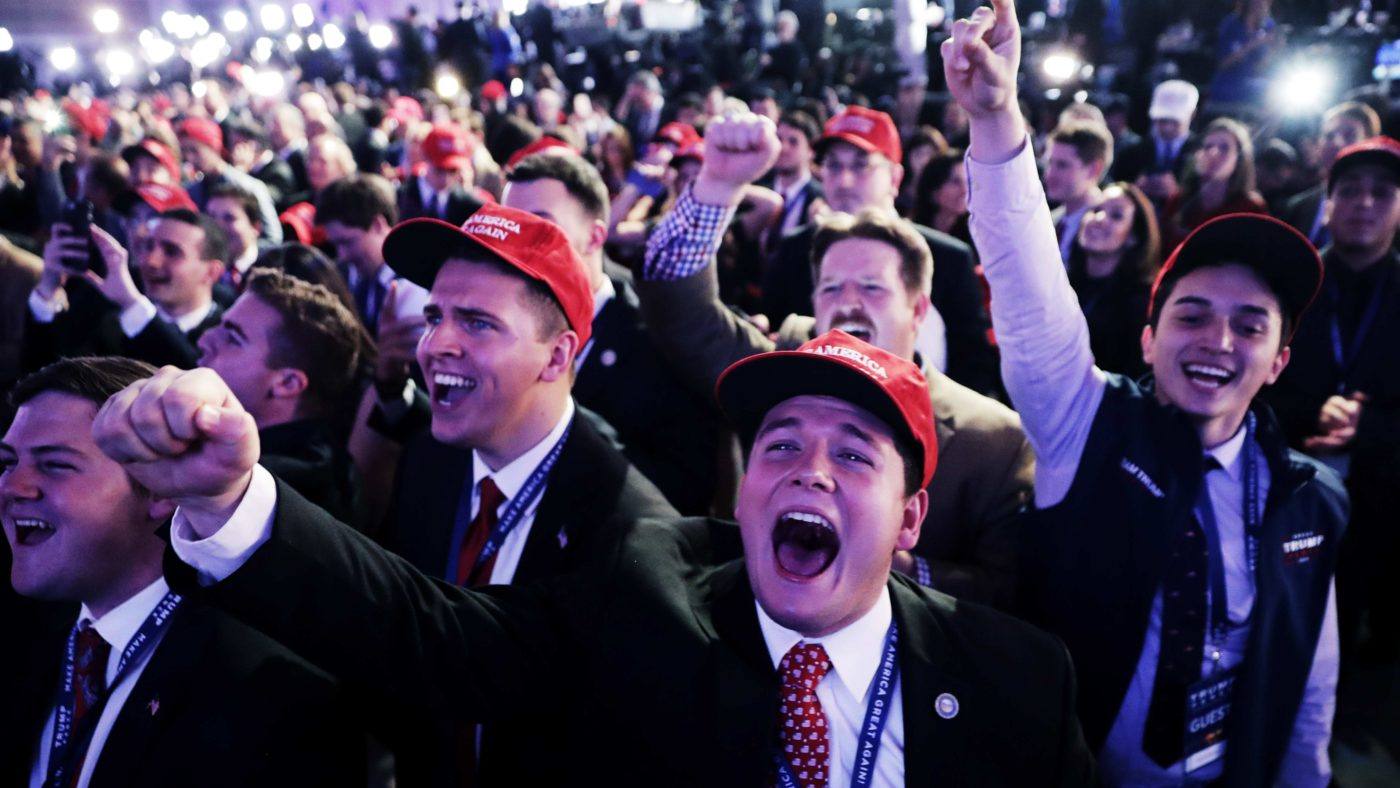The night was laid out before me: cheesy nibbles, caffeine drinks, and, for when things got ugly, an old school bar of Toblerone, being a prescient but sad reminder of a world that used to make sense.
By the time I made it to my bed at around 7am, the fate of the world had been decided or almost decided. Things would never be the same again. Goodbye tightly packed pyramid-shaped chocolate. Hello the next four years and problems for which America’s reality TV president might not have answers.
That night, it had taken a while for CNN to get interesting. For hours they had been running through familiar patterns as early voting pointed towards a Hillary Clinton victory. Everything suggested that this election would not go down as one of those classics that made icons of Cronkite and Rather.
Then, at around two o’clock in the morning (UK time), skies darkened and birds started to fly into windows. Nigel Farage even popped up in a TV studio like some ghoulish omen of strange times. Trump had taken a lead in Florida.
We were told it would swing all night but it soon became obvious that Hillary Clinton would never close the gap. Then there was news that Ohio, North Carolina, and Virginia had Trump in the lead.
Twitter exploded in a frenzy. Not panicking was clearly on people’s collective mind. Stock markets plunged.
At two thirty, the New York Times’s barometer swung over to predict that Trump would win the Presidency. Twitter timelines momentarily fell silent.
For much of the evening, the word “Brexit” had been bandied about, to the amusement of some and the annoyance of others. Of course there would be no correlation, promised experts. Yet here it was: the story of a popularist uprising repeating itself – but this time across six time zones.
This was turning into a defeat for the pollsters, a defeat for establishment politics, a defeat for professional politicians, and a victory for doom-mongers and the ever widening world of celebrity.
If the daylight hours had seen America seriously considering its first female president, as darkness fell it became clear that they had actually voted for a prime-time misogynist.
By 3am, “does he have a path” became “he has several paths”.
Then he took Ohio, a state that has traditionally predicted the final outcome. It meant Trump didn’t need several paths. Any road, it seemed, would lead him to the White House.
Yet, for many of us, the only surprise was that Trump, in fact, knew his electorate better than we’d ever thought he did. I had predicted back in May that he would win but I’d expected more of a play for the moderate ground.
Instead, Trump won this by going on the outside; by motivating the vast hinterland of rustbelt America which responded to a campaign that played to his one and only strength. Trump has an ability to connect with average Americans and especially blue collar voters. His campaign rallies have been master classes in plain speaking.
The media might have talked about his rambling performances but voters saw a man speaking directly to them, in their own inelegant language, filled with adlibbed bluster and threat.
Trump has a capacity to erect demons where none exist, to make promises that are big on gesture and small on detail. Yet he also has an ability to laugh, to make gestures, and to appear normal.
By contrast, Hillary Clinton tried to speak to people’s better natures but it proved beyond her. She lacked her husband’s skill and her rhetoric was banal, her excitement was shrill and not convincingly human.
The scale of Clinton’s failure underlined the secondary narrative of this election. The cycle has been marked by a much changed news landscape and, specifically, the emergence of what Breitbart reporter
Michelle Fields had termed “bias news”: media telling you want you want to hear rather than reality as it is.
Social media is the epitome of that but it has also made its way into the mainstream where “political commentator” is the name now applied to spokespeople of various factions.
Analysis and advocacy have been terribly blurred in this election. Trump had communicated using social media, combining personal speech with campaign messaging. Hillary used social media almost reluctantly and her account was devoid of personality. But this was where so much of the battle was lost.
By 5am, the networks were slowly shifting from analysis to commentary mode. How could America vote for a man who polls so poorly in terms of competency and temperament?
The answer: Trump understood his voters. The Clinton campaign was uninspired and largely addressing the wrong America.
In the last weeks of the campaign, they even broadcast ads in which Trump was seen talking about women belonging in the kitchen and how he demands that his dinner should be waiting for him when he got home. To the Clinton team, it was meant to be conclusive proof that he was unelectable. Never once did they seem capable of understanding that in that other America, many men share Trump’s beliefs. The same goes for his rhetoric on trade, foreign policy, immigration, and that broader sense of what they think of as American values.
By 6am, the New York Times barometer was lodged at “greater than 95 per cent” chance of a Trump victory. The networks stressed that the contest was not yet decided – although Clinton’s chances now relied on clawing back states in which she was trailing.
Then at 7am, John Podesta arrived at the Javits Center where Clinton supporters had gathered. He told them to go home and to wait for the new day.
I can do the same. The Toblerone is gone and so many big questions need answering.
What will happen to the Supreme Court? The walls, healthcare and tax returns?
For now, we have no answers. We are entering a realm of the unknown with a man we barely even know.


